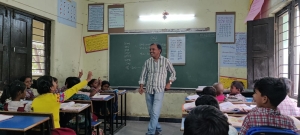In an interview with CSF, Richie Pandey (District Magistrate, Jehanabad, Bihar) shares key highlights of the FLN mission in the state, with a special emphasis on its implementation at the district level. He reflects on the role of parents and the community in advancing foundational learning and deliberates on monitoring and evaluation mechanisms in place to track progress and impact.

(District Magistrate, Jehanabad, Bihar)
Q1. What measures has the district administration taken to ensure effective implementation of the FLN programme? Has the district adopted any strategies to ensure that the programme is inclusive and reaches marginalised communities?
Mission NIPUN Bihar is being successfully implemented in 894 schools with primary grades of the Jehanabad district. One of the key strategies that has resulted in successful implementation of the mission is the establishment of district-level institutions to review and monitor mission progress. The District FLN Mission, District Task Force, and District Assessment Cell have all played a pivotal role in overseeing and steering the mission so that it reaches every school in Jehanabad. Specifically, holding regular meetings of the District Task Force, led by the DEO Jehanabad, has been instrumental in keeping our mission on track. These meetings provide a platform for planning, collaboration and feedback, ensuring that our efforts are aligned with our mission objectives.
We place special focus on orienting headmasters and teachers on FLN. So far, headmasters and teachers have received training both from the State Council of Educational Research and Training (SCERT) and through district-level sessions. These sessions focus on equipping teachers with the necessary knowledge to deliver quality teaching that effectively imparts foundational literacy and numeracy skills to children. More than 1000 headmasters and teachers of Grades 1 to 3 have been trained till date.
Additionally, the district also ensures meticulous monitoring of the usage of FLN kits and other resources (provided by the state) through regular school visits and review meetings with headmasters, which are held daily at the cluster level. This has been helpful in ensuring that the programme is inclusive and the resources reach all communities. The FLN kits have been useful as supporting materials for teachers. Moreover, maintaining a student learning tracker in the classroom for FLN grades was also initiated in all schools to track progress of children on the NIPUN learning outcomes.
Q2. How is the district administration promoting parental and community involvement in the FLN programme? How can local communities contribute to its success?
Aligned with the principles of the National Education Policy 2020, we are committed to nurturing strong partnerships between schools, parents and the local community. The policy emphasizes on the active participation of parents and communities in the educational journey of children. The district administration is actively promoting parental and community involvement in the FLN programme through several strategic measures.
Firstly, we orient PRI members with technical support from CSF and ensure their active participation in the programme’s implementation.
Secondly, The District Education Office, in collaboration with the Panchayati Raj Department, initiated the NIPUN Gram Sabha, in June 2023, in order to create ownership and accountability in the community towards improving their children’s learning environment. The Mukhiya serves as the community representative and leads the NIPUN Gram Sabha to bridge the gap between the community and school. 88 Mukhiyas have been oriented on the NIPUN Bihar Mission till date.
Additionally, we have strategically placed NIPUN Learning Outcomes (LO) posters in Hindi (IEC) at key locations to effectively disseminate information and raise community awareness about the programme’s objectives and benefits. We have also introduced the innovative concept of ‘Home as a Learning Space’ and have distributed posters (sent by the state) on the same. This encourages parents to create an enriching learning environment within their homes, fostering greater engagement in their child’s education.
Q3. How does the district plan to monitor and evaluate the long-term impact of the FLN programme on student learning outcomes and educational equity?
I believe proper structures need to be in place to monitor the progress of any programme or mission and drive implementation in the right direction. Generating data from classrooms is critical for identifying strengths and gaps and providing academic and mentoring support to teachers.
The district administration, supported by CSF, developed a comprehensive Classroom Observation Tool, hosted on a mobile application called ‘Tangerine’. The tool is used by the team to observe classrooms and collect data on teaching learning practices. This robust monitoring system also includes a dedicated dashboard for visualising key metrics and trends. It is certainly a valuable resource for providing support to teachers, identifying areas of improvement and facilitating informed decision making during review meetings.
Q4. How can citizens and organisations contribute to or support the FLN programme’s implementation and the overall improvement of foundational education in the Jehanabad district?
Bihar conducted a baseline assessment of students in the last academic year in Hindi and Mathematics. Through this analysis, we were able to identify areas where students excelled, such as word reading, and also those with room for improvement, particularly reading and understanding passages and writing skills. Our district demonstrates strong performance in number identification, addition and subtraction; however, there is a need to improve shape identification among children.
Awareness among parents and teachers on NIPUN Goals and the kind of challenges that we face today with children’s educational journey is key to bring about change; organisations can contribute greatly to this awareness generation to instill a sense of shared responsibility among community members for achieving FLN skills for children.
Encouraging parents to actively participate in their children’s development in literacy and numeracy can have a profound impact on student learning outcomes. Furthermore, organisations have the opportunity to partner with our schools and provide supplementary resources, conduct workshops or establish mentorship programmes tailored to the needs of children. This collaborative effort, focused on improving FLN for children, holds the potential to directly contribute to the success of the FLN programme in our district.



